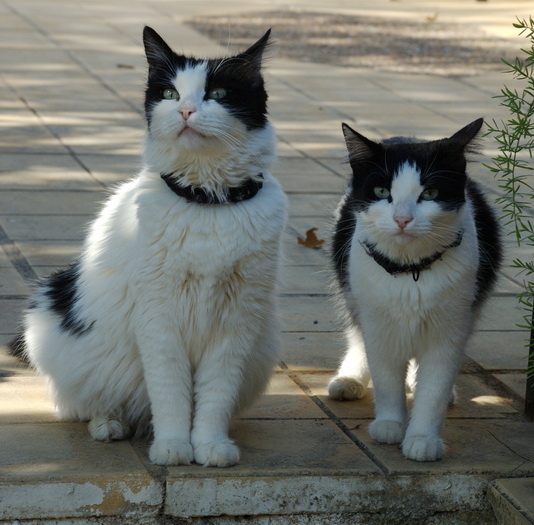Borrowing from earlier times Posted by Ourania on Jun 25, 2014 in Vocabulary
There are a lot of phrases, sayings and even single words that we use every day that come right from ancient Greek. We usually use them exactly in the form we have found them in ancient texts or exactly as they were used to be used in the ancient times. That’s why they sometimes seem weird and we cannot understand their form or grammar. Because they follow a different conjugation pattern: that of the ancient Greek language.
Let’s see some examples of such phrases and what they mean:
Αβρόχοις ποσί (avrohis posi) = literally it means with dry feet, but the metaphorical meaning refers to doing
something without much effort or losses.
Θέλει να πάρει προαγωγή αβρόχοις ποσί. (Thelei na parei proagogi avrohis posi)
He wants to be promoted without any effort.
Άγομαι και φέρομαι (agomai kai feromai) = it means that you are guided or led by others, that you get carried away by others, instead of having your own opinion and making your own decisions.
Ο Κυριάκος άγεται και φέρεται από την μητέρα του. Ποτέ δεν αποφασίζει κάτι μόνος του. ( O Kyriakos agetai kai feretai apo tin mitera tou. Pote den apofasizei kati monos tou.)
Kyriakos is always influenced by his mother. He can’t make a decision by himself.
Αγρόν ηγόραζε (agron igoraze) = uninterested; showing no interest whatsoever.
Του έλεγα να προσέχει στον δρόμο αλλά αυτός αγρόν ηγόραζε! (Tou elega na prosehei ston dromo alla aftos agron igoraze)
I told him to keep his mind on the road but he wouldn’t listen!
Άγνωσται αι βουλαί του υψίστου (agnostai ai voulai tou ipsistou) = the will of God is unknown.
Δεν καταλαβαίνω γιατί έγινε αυτό. Άγνωσται αι βουλαί του υψίστου. (Den katalavaino giati egine afto. Agnostai ai voulai tou ipsistou)
I can’t understand how this happened. God’s will is unknown to us.
Άλλοθι (allothi) = alibi, evidence that you’re innocent.
Ήταν στη δουλειά εκείνη την ώρα. Έχει ισχυρό άλλοθι.(Itan sti douleia ekeini tin ora. Ehei ishiro allothi.)
He was at work at that time. He has a strong alibi.
Αμαχητί (amahiti)= fall without giving a battle.
Πρέπει να διαμαρτυρηθείς. Δεν πρέπει να απολυθείς αμαχητί. (Prepei na diamartiritheis. Den prepei na apolitheis amahiti.)
You have to complain. You cannot be fired without a fight.
Άρδην (ardin) = completely.
Το σχέδιό του απέτυχε άρδην. (To shedio tou apetihe ardin.)
His plan failed completely.
Δούναι και λαβείν (dounai kai lavein)= give and take.
Δεν θέλω πια να έχω δούναι και λαβείν μαζί του. Τελειώσαμε. (Den thelo pia na eho dounai kai lavein mazi tou. Teleiosame.)
I don’t want to have anything to do with him anymore. We are through.
Ει δε μη (eidemi)= otherwise.
Πρέπει να κάνεις τα μαθήματά σου. Ει δε μη, δεν θα δεις καθόλου τηλεόραση. (Prepei na kaneis ta mathimata sou. Eidemi de tha deis katholou tileorasi.)
You have to do your homework. Otherwise, you are not to watch any TV.
Ειρήσθω εν παρόδω (iristho en parodo)= by the way.
Αξίζει να αναφέρουμε, ειρήσθω εν παρόδω, ότι και αυτοί συμφωνούσαν με το σχέδιο. (Axizei na anaferoume eiristho en parodo oti kai aftoi simfonisan me to shedio.)
It’s worth mentioning, by the way, that they agreed with the plan.
Εν πάση περιπτώσει (en pasei periptosei) = anyway.
Ο Κώστας έχει αργήσει. Εν πάση περιπτώσει, μπορούμε να ξεκινήσουμε και χωρίς αυτόν. (O Kostas ehei argisei. En pasei periptosei, moroume na xekinisoume kai horis afton.)
Costas is late. Anyway, we can start without him.
Ιδίοις όμμασιν (idiees omasin)= with my own eyes.
Είναι αλήθεια. Το είδα ιδίοις όμμασιν. (Einai alitheia. To eida idiees omasin.)
It’s true. I saw it with my own two eyes.
Κατ’ εικόνα και καθ’ ομοίωσιν (kateikona kai kathomeeosin)= look alike, similar.
Ο γιός του είναι κατ’ εικόνα και καθ’ ομοίωσιν του πατέρα του. (O gios tou einai kati eikona kai kathomeeosin tou patera tou.)
His son looks very much like his father.
Μείζονος σημασίας (meizonos simasias) = of great importance.
Αυτή η υπόθεση είναι μείζονος σημασίας. Να την δείτε πρώτη. (Afti i ipothesi einai peizonos simasias. Na tin deite proti.)
This case is of great importance. You have to look at it first.
Ο κύβος ερρίφθη (o kivos errifthi.)= the dice has been thrown, the decision has been made.
Θα αγοράσουμε το κόκκινο. Ο κύβος ερρίφθη. (Tha agorasoume to kokino. O kivos erifthi.)
We will buy the red one. The decision has been made.
Ουκ εν τω πολλώ το ευ (ouk en to polo to ef)= the quality isn’t found in quantity.
Δεν χρειάζεται να πάρεις κι άλλη μπλούζα. Έχεις τόσες. Ουκ εν τω πολλώ το ευ! (Den hreiasetai na pareis kialli blouza. Eheis toses. Ouk en to pollo to ef.)
You don’t need to buy another t-shirt. You have so many. Another one isn’t going to add quality
in your look.
Παρανάλωμα του πυρός (paranaloma tou piros) = completely burned.
Το παλιό εργοστάσιο έγινε παρανάλωμα του πυρός σε λίγες μόνο ώρες. (To palio ergostasio egine paranaloma tou piros se liges mono ores.)
The old factory was completely burned in just few hours.
Πατείς με πατώ σε (pateisme patose) = step on each other’s feet; very crowded, congested.
Το λεωφορείο σήμερα ήταν πατείς με πατώ σε. (To leoforeio simera itan pateisme patose.)
The bus today was very crowded.
Φύρδην μίγδην (firdin migdin) = upside down.
Άφησε το δωμάτιό του φύρδην μίγδην. (Afise to domatio tou firdin migdin.)
He left his room upside down.
Ψυχή τε και σώματι (psihite kai somati) = with body and soul; with all my force.
Θα είμαι κοντά σου ψυχή τε και σώματι. (Tha eimai konta sou psihite kai somati.)
I will stand by you with all my force.

Build vocabulary, practice pronunciation, and more with Transparent Language Online. Available anytime, anywhere, on any device.
About the Author: Ourania
Ourania lives in Athens. She holds a degree in French Literature and a Master’s degree in Special Education for Children. Since 2008, she has been teaching Greek to foreigners.





